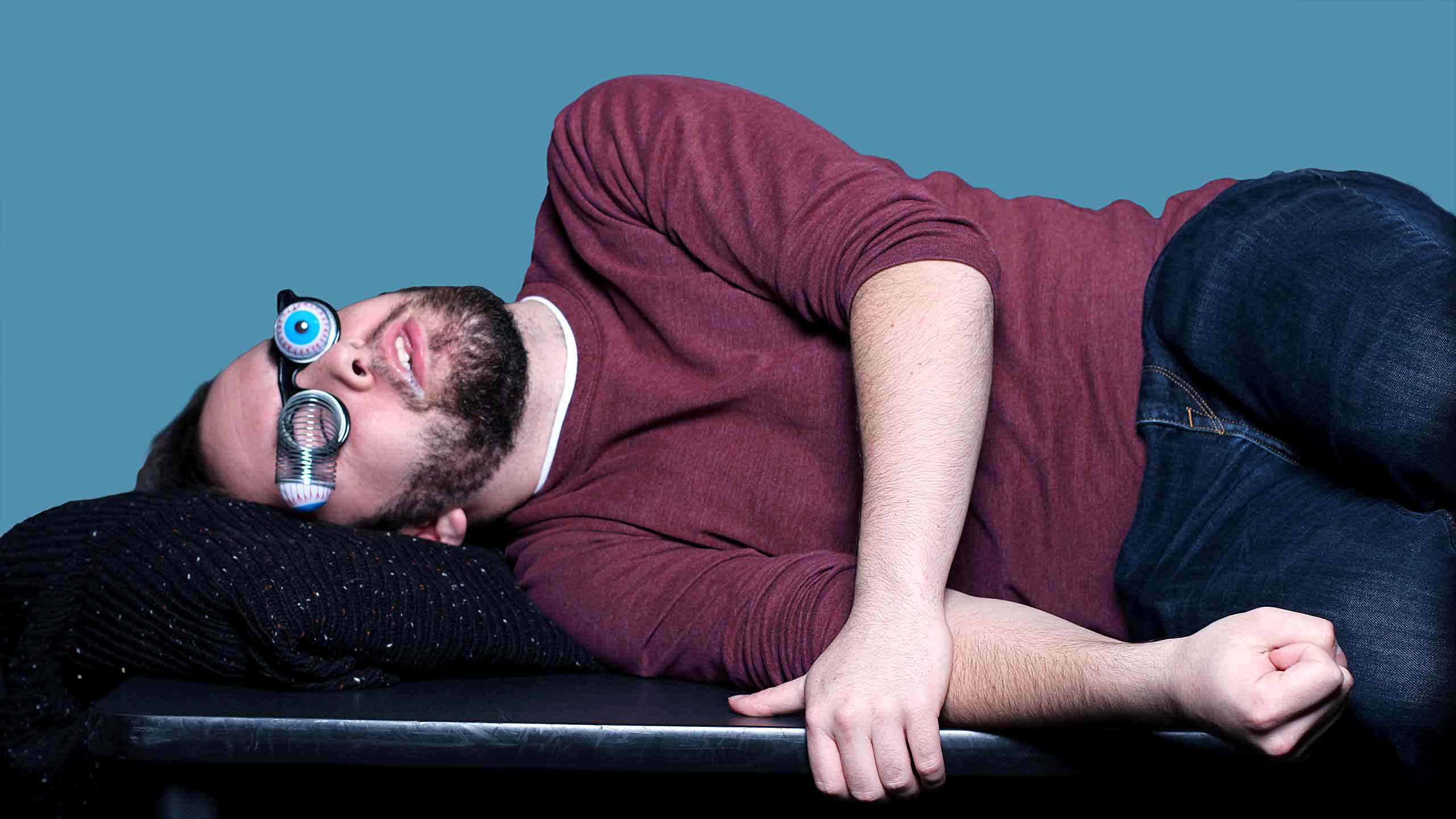By Ben Waldman
On a late Sunday night, sitting at a study booth on the fifth floor of Ryerson’s library building, I slouched down and began to read. The cubicles around me were scattered with coffee cups, chocolate bar wrappers and empty cans of Red Bull—fuel for students’ engines as they sputter toward their respective finish lines.
It was a quarter to midnight and my goal for the evening wasn’t to study the media law and ethics textbook in front of me. Instead, I wanted to study the Red Bull drinkers, the chocolate munchers and the coffee chuggers; I wanted to see what sleep deprivation looked like for the average Canadian university student.
One week earlier, my editor at The Eyeopener convinced me to limit myself to no more than three hours of sleep each day to see how my mind and body would function on a less- than-advisable amount of rest. I foolishly complied.
I’d go to bed at 5 a.m. and set an alarm for 8. It would be fun, we agreed.
The next thing I knew, a security guard was patting me on the back. My face was flattened against chapter four of my textbook, and my sorry excuse for a beard was coated in a thick layer of drool.
“The library is closing, sir,” she said gently.
I looked at her perplexed, with my dry contact lenses sticking from my reddened eyeballs and a bead of saliva swaying off of my chin like the world’s most disgusting pendulum.
The look on her face as she looked at mine said it all: It was time for me to go to bed.
An average year studying at Ryerson costs anywhere between $7,131 and $11,149. Factor in a monthly student Metropass ($112) or rent, and that sweet, sweet bottle of Tropicana Pure Premium orange juice—or whatever you choose to spend your money on—and you’ll be confronted with an all too familiar reminder that it costs a lot of dollars and cents to be here. Students are drowning in bills and their own tears, and finding time to balance it all often means that a healthy sleep schedule is the first thing to go.
According to a 2013 National College Health Assessment survey of Canadian post-secondary students, 68.7 per cent of respondents reported experiencing stress related to school. Of that group, 53 per cent reported sleep difficulties and of that subgroup, nearly half reported that a lack of sleep had adversely affected their academics.
I generally sleep between nine and 10 hours per night. I go to bed relatively early and wake up relatively late. If given the choice of going to a shitty nightclub or staying in, I’d always choose the latter. When it comes to sleep, I’m somewhat of an outlier.
Anjali Rawat, a third-year engineering student at Ryerson, guesses that she pulls at least one all-nighter every week in order to study or work on school assignments.
“Do you think that makes you a better or worse student?” I asked her.
“Worse for sure.”
Rawat says that over her time in university, she’s gotten better at finding time to sleep. More often than not, though, that time doesn’t fall at night.
Equipped with food and tons of caffeine, Rawat and several other engineering students use the evening hours to make sure they don’t fall behind on schoolwork.
“I once crushed a caffeine pill and snorted it because a friend told me it would absorb faster,” Rawat jokes.
University programs can be extremely demanding and that reality often leads to overwhelming stress for students like Rawat. There simply aren’t enough hours in a day to study, socialize, eat and sleep. A deficit in one area can lead to a deeply effective chain reaction.
It’s recommended that university students get at least eight hours of sleep each night. Throughout this experiment, I lost an average of six hours each night. Over nine days, that adds up to a total of 54 hours lost. Rapid changes like that can alter your body chemistry.
“I once crushed a caffeine pill and snorted it because a friend told me it would absorb faster”
Relative sleep deprivation affects everyone differently. For some people, it basically sets up a blockade in the way of information recall. It can cause lapses in judgment and a highly volatile emotional state.
At first—or at least by all surface indications—I thought I was invincible and impervious to the effects of extreme wakefulness.
My schoolwork didn’t slip, I didn’t forget about tasks or appointments and I didn’t lash out at anyone with a tantrum or undue anger.
In fact, I felt considerably calmer than I had before I started limiting my sleep.
“Maybe this was unusual,” I thought. So I consulted an expert.
Kevin MacDonald, a PhD student in behavioural and cognitive neuroscience at Brock University’s sleep research laboratory, is fascinated by sleep. His voice lifts when he talks about the benefits of shut-eye.
“I want to understand as much about sleep as I can,” he told me over the phone, citing several recommendations for getting more sleep throughout our conversation.
You shouldn’t really be spending time in bed for anything other than sleep, MacDonald warns. Staring at screens before bed lowers your body’s levels of melatonin, a hormone that essentially makes you drowsy when it gets dark, because of the specific kind of light electronics emit.
His friends and coworkers have described him as “Spock-like,” referring to the mysterious crewmember on Star Trek’s USS Enterprise. This comparison is based on MacDonald’s logic-driven, inquisitive nature—but it could also have a double meaning.
“Under stress, we Vulcans can do without sleep for weeks,” Leonard Nimoy’s Spock said in a 1968 episode of Star Trek. Sadly, most Canadian students don’t have the luxury of being Vulcan, so research teams like Brock’s continue to prod the mysteries of sleep.
In 2012, a team of researchers at Brock studied sleep deprivation by examining 24 young men and 25 young women. The researchers wanted to examine the impact of 33 hours of sleep loss on each assigned group.
The study, which MacDonald didn’t contribute to as an author, found that sleep deprivation actually decreased testosterone levels in young men by about 27 per cent, thus leading to a decrease in reactive aggression.
So, the calmness I’d been feeling wasn’t all that shocking to MacDonald.
Ironically, one of the only ways that researchers like MacDonald can analyze, observe and understand the effects of sleep deprivation is to run sleep studies overnight.
“I’m sorry,” he laughed. “I’m tired.”
“We laugh about that,” he says before chuckling softly. To study sleep deprivation, researchers become somewhat deprived of sleep themselves.
A few minutes before our phone call end- ed, MacDonald yawned when I asked him a question.
“I’m sorry,” he laughed. “I’m tired.”
Before my library snooze, I spent the night at Indigo in the Eaton Centre, where I got hired for the holiday season.
From 10:00 p.m. until 6:00 a.m., with a group of 13 other employees, I unpacked box after box of Dan Brown books and Lego sets.
We priced the inventory and took it to its respective section of the two-storey behemoth bookseller.
After each box was emptied, we collapsed it and tossed it into a pile beside us. I was lucky to not have collapsed into the heap myself.
Before that night—my first overnight shift— I didn’t really understand that the store relied on staff members to put all the new stock away as it arrived. It didn’t happen magically, of course, but now I saw: this was hard work.
To a lot of people, including students, it makes sense to work at night. Each hour spent not working is an hour spent not earning. After weighing the cost of work vs. sleep during my 1:45 a.m. “lunch break,” I immediately saw the incentive of giving up a night’s sleep to make more money.
But a few minutes after my break ended, I could barely read the titles of the books I was putting away.
A coworker told me she had worked several of these shifts in the past week. “I’m turning into a vampire,” she said as I picked up a copy of Bram Stoker’s Dracula.
At six a.m., I ambled out onto Yonge Street to begin my walk home. “I actually don’t feel too tired,” I thought.
I could barely read the titles of the books I was putting away
At the intersection of Church and Wellesley Streets, I noticed that the hot dog cart on the corner was still open. The smell was ap- pealing even at that ungodly hour.
Inside, the vendor sat and snored.
“Have you been sitting here all night?” I asked.
He nodded.
A moment later, he resumed his snoring. By the time I got up to my apartment about 10 minutes later, I could barely stand up. My legs felt like they were filled with yogurt and my eyes were bloodshot. Even if I didn’t feel it a few days before, by then I certainly understood what a lack of sleep could do to me. I felt muggy, my vision was blurry and my movements and reactions were slow.
You can only run away from the symptoms of not sleeping until they catch up to you; sleep is not for the weak.
After kicking my shoes off, I walked into the bathroom and flipped on the lights.
The look on my face in the mirror said it all: It was time for me to go to bed.
But at 8:00 a.m. my alarm went off. It was time for me to wake up again.












Leave a Reply